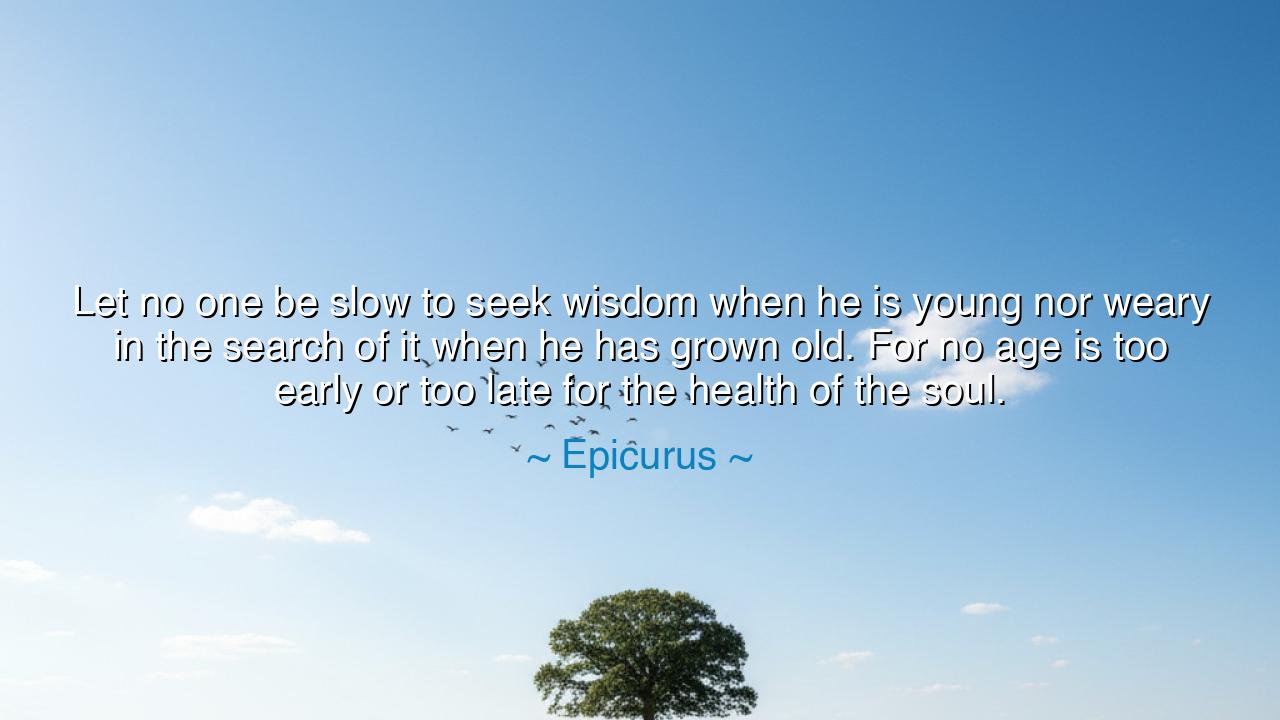
Let no one be slow to seek wisdom when he is young nor weary in
Let no one be slow to seek wisdom when he is young nor weary in the search of it when he has grown old. For no age is too early or too late for the health of the soul.






"Let no one be slow to seek wisdom when he is young nor weary in the search of it when he has grown old. For no age is too early or too late for the health of the soul." These words from Epicurus, the great philosopher of the ancient world, invite us to reflect on the timeless and eternal pursuit of wisdom. In this quote, Epicurus reminds us that wisdom is not bound by age, and that the search for it should never cease, whether in youth or in the twilight years of life. To seek wisdom is to engage in the cultivation of the soul, to continually strive for deeper understanding, and to shape the self in accordance with virtue and truth. Wisdom is the medicine for the soul, and it is through learning and growth that we achieve peace, clarity, and ultimately, a life well-lived.
In the teachings of the ancients, philosophy was often seen not as an intellectual pursuit, but as the very foundation of living a virtuous life. For Socrates, the pursuit of wisdom was a sacred calling. He famously declared that "the unexamined life is not worth living." To examine one’s life, to ask deep questions about our purpose, and to seek to understand the nature of things, was to engage in the pursuit of truth. It was a lifelong commitment, and Socrates himself, despite the advancing years of his life, remained dedicated to questioning, learning, and teaching. His life demonstrates that wisdom does not arrive automatically with age; it requires effort, inquiry, and the willingness to remain teachable, no matter how many years we have lived.
Epicurus, too, understood that wisdom was not to be reserved for the young or the old alone, but was essential at every stage of life. In his philosophy, pleasure and contentment are born from wisdom, and the soul must be constantly nourished by the pursuit of knowledge. The desire for pleasure is often confused with sensual indulgence, but for Epicurus, true pleasure was found not in material wealth or fleeting desires, but in the peace and clarity that come with a wise and examined life. Epicurus himself practiced what he preached, cultivating friendships and dialogue around philosophical discussions throughout his life, maintaining an openness to learning no matter his age. He sought not only to understand the world, but to understand the self and how to live a life of virtue and happiness.
The **life of Leonardo da Vinci offers a striking example of Epicurus' wisdom in action. Da Vinci, whose genius spanned the fields of art, science, and engineering, continued to learn, observe, and experiment throughout his entire life. As an artist, he was constantly refining his techniques, always searching for new knowledge to enhance his creations. But even in his later years, da Vinci remained dedicated to exploring the mysteries of nature, the human form, and the universe itself. Da Vinci’s insatiable curiosity and drive to learn exemplify Epicurus' teaching that wisdom should be sought at every age, and that the pursuit of understanding and truth is the path to a healthy and fulfilled life. His life shows that age is no barrier to the quest for wisdom—in fact, it is the deepening of that quest as we mature that can lead to profound growth.
The essence of Epicurus’s message is that wisdom is the key to the health of the soul, regardless of the stage of life we find ourselves in. There is no time in life when we should cease the search for understanding, no age at which we can say we have attained enough knowledge. To grow wise is to cultivate the mind, to reflect on our experiences, and to strive to live in harmony with virtue and reason. Whether we are young, seeking to understand our place in the world, or older, looking to make sense of a lifetime of choices, the search for wisdom is essential to the flourishing of the human soul.
The lesson that Epicurus imparts is one of continuity in our pursuit of knowledge. We must not let age dictate when we stop seeking or stop learning. Just as youth requires constant growth in knowledge, so too does old age demand a lifelong commitment to wisdom. To allow our minds to stagnate, to stop asking questions or seeking answers, is to let the soul wither. We must be like the ancients who valued education and reflection as lifelong practices. Even as we grow older, we must remain curious, open to learning, and engaged with the world around us.
In practical terms, this means that we should never stop learning. Seek mentorship, read widely, engage in thoughtful reflection, and be ready to question your own beliefs. Pursue wisdom not as a destination, but as a continual journey. Be teachable, and allow experience and knowledge to shape your path at every stage of life. Whether you are young or old, the health of the soul comes from a life lived with intention, with a dedication to both the joy and the challenges of learning. As Epicurus teaches, there is no such thing as a time when wisdom is unnecessary—there is only the ongoing process of growth and understanding.






AAdministratorAdministrator
Welcome, honored guests. Please leave a comment, we will respond soon